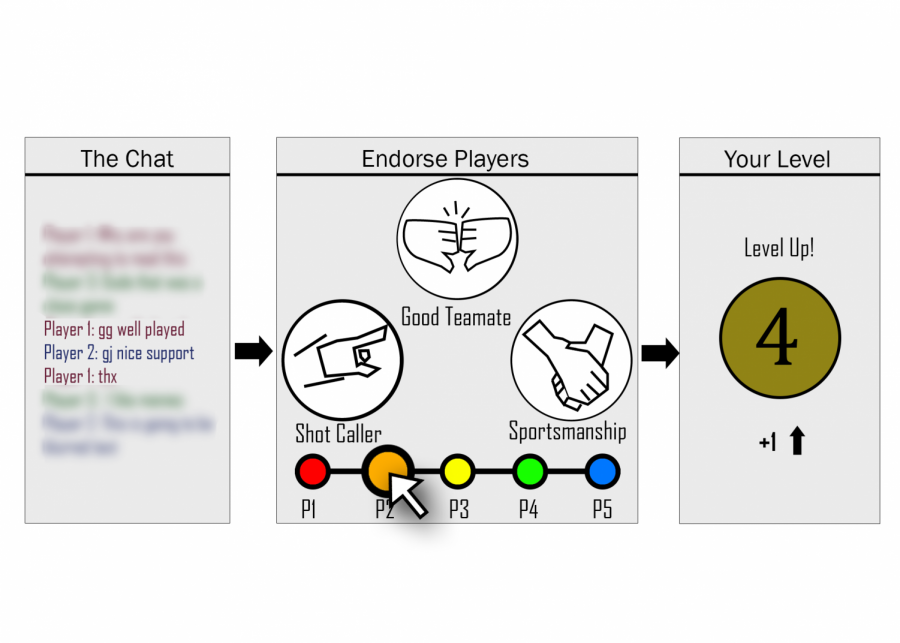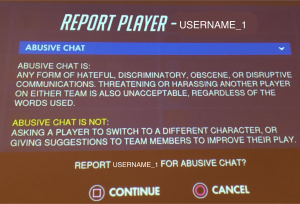Remedying video game toxicity: Can the new incentives in “Overwatch” get the job done?
September 3, 2018
“We often talk about ways to punish players who are behaving poorly and it’s not very exciting to a lot of us,” Jeff Kaplan, the lead designer of the Blizzard Entertainment video game “Overwatch,” started in his developer update for early June. “I think, more often than not, players are behaving in an awesome way in Overwatch, and we just don’t recognize them enough, so we’re super excited to introduce a feature called ‘endorsements.’”
As Kaplan continued to explain, the endorsements feature was just a concrete ranking, or “endorsement level,” assigned to players based on their conduct, analogous to the normal skill rating based on playing skill, designed to make gaming experiences more positive. In an environment full of toxicity, the concept was undoubtedly intriguing, having the potential to remedy a problem that needed addressing.
Most policies regarding behavior on gaming channels have been of a punitive nature, with the most common repercussion being account suspension. Despite these countermeasures, language and actions filled with racism, misogyny, religious disparagement, harassment and insensitivity, all packed into the umbrella term “toxicity,” has become rife in many video games.
But the proposed concept of endorsements introduces the idea incentivized reinforcement of exemplary behavior. Givers receive a boost to their experience level (XP), and likewise, the endorsement counts towards the endorsement level of recipients, which in turn yields in-game rewards. The endorsement system also amplifies the power of punitive measures, as bad behavior can completely remove a player’s endorsements.
Indeed, the endorsements system, and other new social networking features, seem to be working. In early July, Kaplan reported that abusive chat was down more than 25%, and many players reported a surge in friendly communication and cooperation.
Still, there are side effects. Players could hand out endorsements without a true reason, just for the small XP boost for themselves, blurring the line between a genuine endorsement and one handed out randomly. There’s also the problem of “fake niceness,” a term critics use to point out that the recent surge in kindness could be caused in part just by players wanting to gain from the system. If players associate endorsements with fake niceness, then those who genuinely want to spread kindness and positivity run the risk of being chided.
The system isn’t a complete solution to toxicity either as some just ignore it. The misogynistic culture that pushes female gamers to stay quiet in voice channel largely remains, as well a whole host of toxic behaviors that did not, in fact, disappear overnight.
On the surface level of fighting toxicity, endorsements are a true step forward. For many, it will effectively dissuade bad behavior. Whether or not the feature has a net benefit when side effects are taken into account, the thought certainly counts. In any case, now is not the time to be complacent with the system: rather, this is the perfect time to push the pedal and build off of Blizzard’s first step to work towards remedying toxicity in the gaming culture.
This piece was originally published in the pages of The Winged Post on Aug. 31, 2018.


















![“[Building nerf blasters] became this outlet of creativity for me that hasn't been matched by anything else. The process [of] making a build complete to your desire is such a painstakingly difficult process, but I've had to learn from [the skills needed from] soldering to proper painting. There's so many different options for everything, if you think about it, it exists. The best part is [that] if it doesn't exist, you can build it yourself," Ishaan Parate said.](https://harkeraquila.com/wp-content/uploads/2022/08/DSC_8149-900x604.jpg)




![“When I came into high school, I was ready to be a follower. But DECA was a game changer for me. It helped me overcome my fear of public speaking, and it's played such a major role in who I've become today. To be able to successfully lead a chapter of 150 students, an officer team and be one of the upperclassmen I once really admired is something I'm [really] proud of,” Anvitha Tummala ('21) said.](https://harkeraquila.com/wp-content/uploads/2021/07/Screen-Shot-2021-07-25-at-9.50.05-AM-900x594.png)







![“I think getting up in the morning and having a sense of purpose [is exciting]. I think without a certain amount of drive, life is kind of obsolete and mundane, and I think having that every single day is what makes each day unique and kind of makes life exciting,” Neymika Jain (12) said.](https://harkeraquila.com/wp-content/uploads/2017/06/Screen-Shot-2017-06-03-at-4.54.16-PM.png)








![“My slogan is ‘slow feet, don’t eat, and I’m hungry.’ You need to run fast to get where you are–you aren't going to get those championships if you aren't fast,” Angel Cervantes (12) said. “I want to do well in school on my tests and in track and win championships for my team. I live by that, [and] I can do that anywhere: in the classroom or on the field.”](https://harkeraquila.com/wp-content/uploads/2018/06/DSC5146-900x601.jpg)
![“[Volleyball has] taught me how to fall correctly, and another thing it taught is that you don’t have to be the best at something to be good at it. If you just hit the ball in a smart way, then it still scores points and you’re good at it. You could be a background player and still make a much bigger impact on the team than you would think,” Anya Gert (’20) said.](https://harkeraquila.com/wp-content/uploads/2020/06/AnnaGert_JinTuan_HoHPhotoEdited-600x900.jpeg)

![“I'm not nearly there yet, but [my confidence has] definitely been getting better since I was pretty shy and timid coming into Harker my freshman year. I know that there's a lot of people that are really confident in what they do, and I really admire them. Everyone's so driven and that has really pushed me to kind of try to find my own place in high school and be more confident,” Alyssa Huang (’20) said.](https://harkeraquila.com/wp-content/uploads/2020/06/AlyssaHuang_EmilyChen_HoHPhoto-900x749.jpeg)











